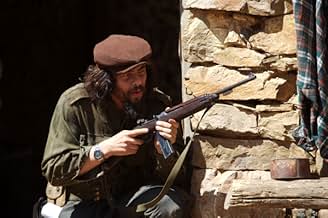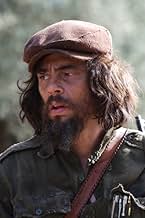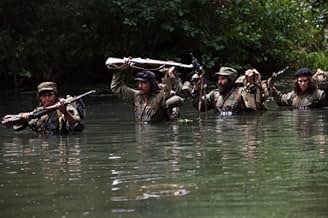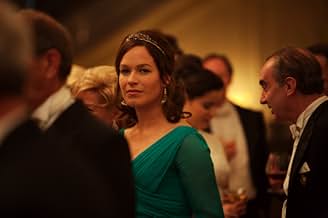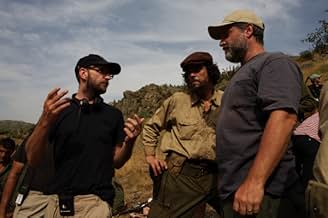IMDb-BEWERTUNG
6,8/10
35.871
IHRE BEWERTUNG
Im Jahr 1967 führt Ernesto "Che" Guevara eine kleine Partisanenarmee an, um einen erfolglosen revolutionären Guerillakrieg in Bolivien, Südamerika, zu führen.Im Jahr 1967 führt Ernesto "Che" Guevara eine kleine Partisanenarmee an, um einen erfolglosen revolutionären Guerillakrieg in Bolivien, Südamerika, zu führen.Im Jahr 1967 führt Ernesto "Che" Guevara eine kleine Partisanenarmee an, um einen erfolglosen revolutionären Guerillakrieg in Bolivien, Südamerika, zu führen.
- Regie
- Drehbuch
- Hauptbesetzung
- Auszeichnungen
- 2 Gewinne & 7 Nominierungen insgesamt
Demián Bichir
- Fidel Castro
- (as Demian Bichir)
Empfohlene Bewertungen
Possibly the most brilliant thing about Che: Part Two, as we begin to integrate it with Part One in our minds, is that there is no clarification of why Che chose to confidentially abscond from Cuba after the revolution, no allusion to his experience in the Congo, no clarification of why he chose Bolivia as his subsequent setting for a coup d'etat, no allusion to the political decisions he made as a young man motorcycling across South America, which Walter Salles has given prominent familiarity. Extraordinary focus is given to Che meeting the volunteers who accompany his guerrilla factions. Yet hardly any endeavor is made to single them out as individuals, to establish involved relationships. He is reasonably unreasonable. Che drives an unbreakable doctrine to leave no wounded man behind. But there is no feeling that he is deeply directly concerned with his men. It is the concept.
In Part 1, in Cuba, the rebels are welcomed by the people of the villages, given food and cover, supported in what grows to be a victorious revolution. Here, in Bolivia, not much understanding is apparent. Villagers expose him. They protect government troops, not his own. When he expounds on the onesidedness of the government medical system, his audience appears uninterested. You cannot lead a people into revolution if they do not want to comply. Soderbergh shows U.S. military advisers working with the Bolivians, but doesn't fault the United States for Che's collapse. Che seems to have just misfigured his fight and the place where he wanted to have it.
In showcasing both wars, Soderbergh doesn't build his battle scenes as actions with specific results. Che's men attack and are attacked. They exchange fire with faraway assailants. There is generally a cut to the group in the aftershock of combat, its death toll not paused for. This is not a war movie. It is about one man's reasonably unreasonable drive to endure. There is no elaborate cinematography. Soderbergh looks firmly at Che's inflexible dedication. There are remarkable sporadic visceral shots, but being few they are all the more powerful, such as Che's POV shot during his final beats. There is an abundance of the terrain, where these men live for weeks at a time, and the all-consuming effect is of languor, Guevara himself having malaria part of the time.
Benicio Del Toro, one of the film's producers, gives a champion's performance, not least because it's modest. He isn't portrayed as the cutting edge like most epic heroes. In Cuba, he arises in conquest, in Bolivia, he falls to the reverse, and occasionally is actually difficult to distinguish behind a tangle of beard and hair. Del Toro illustrates not so much an identity as an attitude. You may think the film is too long. I think there's a genuine cause for its breadth. Guevara's affairs in Cuba and particularly Bolivia was not a sequence of episodes and sketches, but an undertaking of staying power that might virtually be called insane. In the end, Che as a whole or in parts is a commercially ballsy movie, one where its director begins by understanding the limits innate in cinematic biography and working progressively within those means.
In Part 1, in Cuba, the rebels are welcomed by the people of the villages, given food and cover, supported in what grows to be a victorious revolution. Here, in Bolivia, not much understanding is apparent. Villagers expose him. They protect government troops, not his own. When he expounds on the onesidedness of the government medical system, his audience appears uninterested. You cannot lead a people into revolution if they do not want to comply. Soderbergh shows U.S. military advisers working with the Bolivians, but doesn't fault the United States for Che's collapse. Che seems to have just misfigured his fight and the place where he wanted to have it.
In showcasing both wars, Soderbergh doesn't build his battle scenes as actions with specific results. Che's men attack and are attacked. They exchange fire with faraway assailants. There is generally a cut to the group in the aftershock of combat, its death toll not paused for. This is not a war movie. It is about one man's reasonably unreasonable drive to endure. There is no elaborate cinematography. Soderbergh looks firmly at Che's inflexible dedication. There are remarkable sporadic visceral shots, but being few they are all the more powerful, such as Che's POV shot during his final beats. There is an abundance of the terrain, where these men live for weeks at a time, and the all-consuming effect is of languor, Guevara himself having malaria part of the time.
Benicio Del Toro, one of the film's producers, gives a champion's performance, not least because it's modest. He isn't portrayed as the cutting edge like most epic heroes. In Cuba, he arises in conquest, in Bolivia, he falls to the reverse, and occasionally is actually difficult to distinguish behind a tangle of beard and hair. Del Toro illustrates not so much an identity as an attitude. You may think the film is too long. I think there's a genuine cause for its breadth. Guevara's affairs in Cuba and particularly Bolivia was not a sequence of episodes and sketches, but an undertaking of staying power that might virtually be called insane. In the end, Che as a whole or in parts is a commercially ballsy movie, one where its director begins by understanding the limits innate in cinematic biography and working progressively within those means.
I came to watch Guerrilla, part two of Steven Soderbergh's biopic of Che Guevara, without having seen the preceding film and without more than a cursory knowledge of Che's life. At the same time I was rather apprehensive that this would be both a heavy-going history lesson and an unrepentant love-letter to the iconic revolutionary. As it turns out, this film far exceeded my expectations.
Guerrilla works remarkably well as a standalone film. The story of Che's failed attempt to lead a revolution in Bolivia, then under military rule, is a compelling tragedy. The initial impetus brought by Che's arrival incognito to lead the guerrilla war is lost as misfortune follows misfortune. The odds stack up against the revolutionaries. US backing for the Bolivian army, hostile conditions in the rainforest, suspicious locals and Che's failing health are just some of the difficulties which beset the nascent rebellion.
Soderbergh's portrayal of Che is largely uncritical, but this film is no hagiography. The style is refreshingly undramatic, with a subtle and effective soundtrack by Alberto Iglesias adding quiet drama to many scenes. Che is undoubtedly the centre of the film but there are very few close-ups of his face and we are encouraged to see the people fighting alongside him and sometimes against him too. Where Soderbergh wishes to demonstrate Che's virtues we see it in small episodes such as the loyal acolyte who upbraids two fellow guerrillas when they question Che's leadership, and emphasises the sacrifice that he has made in leaving behind Cuba to fight again for revolution.
The direction throughout is superb. Part two feels tightly edited despite its narrow focus and is able to communicate a great deal through images without the need for a narrator to spell things out for the audience. At the start of the film we see a few short clips of lavish parties in post-revolutionary Cuba, immediately furnishing us with ideas as to why Che would sacrifice his old life to fight again in another country. Later on, the portrayal of guerrillas marching through the unending rainforests stands out as a strikingly beautiful scene and helps to create a feeling of the enormity of the task before this tiny band of revolutionaries.
If there is a problem with the film it is the distance between the viewer and Che, which, though it does allow us to appreciate the context of the insurgency and the people around him, makes it hard for us to understand him better as a person. True, Benicio Del Toro is utterly convincing in the lead role so much so that it is difficult to remember that you are watching an actor and not the man himself. However, watching Guerrilla as a standalone film means that we are given precious little insight into what is shaping Che's thoughts, words and actions. It is to be hoped that this is more to the fore in the first part of Soderbergh's biopic (I cannot comment on that yet), and certainly the strength of part two is making me look forward eagerly to seeing the prequel.
Guerrilla works remarkably well as a standalone film. The story of Che's failed attempt to lead a revolution in Bolivia, then under military rule, is a compelling tragedy. The initial impetus brought by Che's arrival incognito to lead the guerrilla war is lost as misfortune follows misfortune. The odds stack up against the revolutionaries. US backing for the Bolivian army, hostile conditions in the rainforest, suspicious locals and Che's failing health are just some of the difficulties which beset the nascent rebellion.
Soderbergh's portrayal of Che is largely uncritical, but this film is no hagiography. The style is refreshingly undramatic, with a subtle and effective soundtrack by Alberto Iglesias adding quiet drama to many scenes. Che is undoubtedly the centre of the film but there are very few close-ups of his face and we are encouraged to see the people fighting alongside him and sometimes against him too. Where Soderbergh wishes to demonstrate Che's virtues we see it in small episodes such as the loyal acolyte who upbraids two fellow guerrillas when they question Che's leadership, and emphasises the sacrifice that he has made in leaving behind Cuba to fight again for revolution.
The direction throughout is superb. Part two feels tightly edited despite its narrow focus and is able to communicate a great deal through images without the need for a narrator to spell things out for the audience. At the start of the film we see a few short clips of lavish parties in post-revolutionary Cuba, immediately furnishing us with ideas as to why Che would sacrifice his old life to fight again in another country. Later on, the portrayal of guerrillas marching through the unending rainforests stands out as a strikingly beautiful scene and helps to create a feeling of the enormity of the task before this tiny band of revolutionaries.
If there is a problem with the film it is the distance between the viewer and Che, which, though it does allow us to appreciate the context of the insurgency and the people around him, makes it hard for us to understand him better as a person. True, Benicio Del Toro is utterly convincing in the lead role so much so that it is difficult to remember that you are watching an actor and not the man himself. However, watching Guerrilla as a standalone film means that we are given precious little insight into what is shaping Che's thoughts, words and actions. It is to be hoped that this is more to the fore in the first part of Soderbergh's biopic (I cannot comment on that yet), and certainly the strength of part two is making me look forward eagerly to seeing the prequel.
Following directly from where the story left off in part one, the second half which sets about telling the inevitable downfall and much more grim side of the man's legacy is exactly as such. In direct contrast to the first feature, part two represents a shift from Che the pride and glory of a revolutionised country, to Chestruggling liberator of a country to which he has no previous ties. The change of setting isn't just aesthetic; from the autumn and spring greys of the woodlands comes a change of tone and heart to the feature, replacing the optimism of the predecessor with a cynical, battered and bruised reality aligned to an all new struggle. Yet, as Che would go on to say himselfsuch a struggle is best told exactly as thata struggle. While Part One certainly helped document that initial surge to power that the revolutionary guerrilla acquired through just that, Part Two takes a much more refined, callous and bleak segment of Che's life and ambition, and gives it an assertive portrayal that is both poignant and tragic in a tangible, easy to grasp manner.
While the movie's tone in some regards does stray off and differ quite drastically from Part One however, there still remains that same documented approach taken a month ago that avoids melodrama and fabrication as much as possible. This somewhat distant, cold approach to telling Che's story and struggle will no doubt turn some viewers off; indeed, I still remain reserved about whether or not the feature itself should have been named after one manif anything, the entirety of Che, taken as a whole, delivers a tale that goes beyond mere biography and instead documents a man's struggle alongside those who helped carry him along the way. By no means does Soderbergh try to paint a humanistic portrait here akin to what Hirschbiegel did with Der Untergang half a decade ago (excuse the ironic contrast); Che is a slow moving, reserved and meditative approach to telling a history lesson that just happens to be narrated by the one man who arguably- conducted the whole thing.
Yet by moving from the lush green landscapes of Cuba and retreating to the bleak, decaying backdrop of Bolivia for Part Two, the story does inevitably take on a distinctly contrasting tone that doesn't feel too disjointed from its predecessor, but does enough to give it its own reference points. Here, the basic structure of Part One is echoed backthere's the initial struggle, the battles, the fallen comrades and the recruiting of those to replace them, all the while we see some glimpses of the man behind the movement. Yet, as anyone with the vaguest idea of the actual history behind the feature will know, Part Two is destined to end on a much more underwhelming, and disquieting note. This difference, in combination with the similarities to Part One, make a compelling and memorable whole; by all means, both could be digested one their own (and kudos to Soderbergh for achieving as such) and enjoyed as they are, but taken as one statement, Che delivers exactly what it sets out to achieve.
Indeed, everything that made Part One the treat that it was one month prior is still evident here from the subtle yet engrossing performances from the central cast to the slow building, realistically structured combat scenesthe drama inherent to the characters on screen is just as vague and indiscernible, but with a feature such as this, Part Two once again proves that avoiding such elements don't necessarily hurt a film when there is enough plot and reflection on other elements to keep the viewer engaged. In fact, upon writing this review I was at odds as to whether or not to simply add a paragraph or two to my initial review for Part One, and title the review as a whole, yet I felt that to do so would only serve to disillusion those who may sit down to watch the entirety of both films consecutively.
With that said, I cannot rightfully decree whether or not Che holds up to the task of engaging an audience for its sprawling four hour plus runtime, but upon viewing both segments I can at least attest to each part's ability to do just that. With a reflective, intricate screenplay combined with endlessly mesmerising photography and nuanced performances that do justice to the movie's characters without drawing attention to themselves, Che Part Two is every bit as compelling and rewarding as its predecessor, but this time with a tragic but uplifting, reaffirming conclusion fit for the history pages of film.
While the movie's tone in some regards does stray off and differ quite drastically from Part One however, there still remains that same documented approach taken a month ago that avoids melodrama and fabrication as much as possible. This somewhat distant, cold approach to telling Che's story and struggle will no doubt turn some viewers off; indeed, I still remain reserved about whether or not the feature itself should have been named after one manif anything, the entirety of Che, taken as a whole, delivers a tale that goes beyond mere biography and instead documents a man's struggle alongside those who helped carry him along the way. By no means does Soderbergh try to paint a humanistic portrait here akin to what Hirschbiegel did with Der Untergang half a decade ago (excuse the ironic contrast); Che is a slow moving, reserved and meditative approach to telling a history lesson that just happens to be narrated by the one man who arguably- conducted the whole thing.
Yet by moving from the lush green landscapes of Cuba and retreating to the bleak, decaying backdrop of Bolivia for Part Two, the story does inevitably take on a distinctly contrasting tone that doesn't feel too disjointed from its predecessor, but does enough to give it its own reference points. Here, the basic structure of Part One is echoed backthere's the initial struggle, the battles, the fallen comrades and the recruiting of those to replace them, all the while we see some glimpses of the man behind the movement. Yet, as anyone with the vaguest idea of the actual history behind the feature will know, Part Two is destined to end on a much more underwhelming, and disquieting note. This difference, in combination with the similarities to Part One, make a compelling and memorable whole; by all means, both could be digested one their own (and kudos to Soderbergh for achieving as such) and enjoyed as they are, but taken as one statement, Che delivers exactly what it sets out to achieve.
Indeed, everything that made Part One the treat that it was one month prior is still evident here from the subtle yet engrossing performances from the central cast to the slow building, realistically structured combat scenesthe drama inherent to the characters on screen is just as vague and indiscernible, but with a feature such as this, Part Two once again proves that avoiding such elements don't necessarily hurt a film when there is enough plot and reflection on other elements to keep the viewer engaged. In fact, upon writing this review I was at odds as to whether or not to simply add a paragraph or two to my initial review for Part One, and title the review as a whole, yet I felt that to do so would only serve to disillusion those who may sit down to watch the entirety of both films consecutively.
With that said, I cannot rightfully decree whether or not Che holds up to the task of engaging an audience for its sprawling four hour plus runtime, but upon viewing both segments I can at least attest to each part's ability to do just that. With a reflective, intricate screenplay combined with endlessly mesmerising photography and nuanced performances that do justice to the movie's characters without drawing attention to themselves, Che Part Two is every bit as compelling and rewarding as its predecessor, but this time with a tragic but uplifting, reaffirming conclusion fit for the history pages of film.
- A review by Jamie Robert Ward (http://www.invocus.net)
In terms of a (loose) description, part one of this two part series covers Ernesto Che Guevara's travels, alongside Fidel Castro, from Mexico to Cuba and his rise, organizing and leading his fighters, finally culminating in Castro's seizure of power in Cuba from Fulgencio Batista. The second film, rather different in tone and spirit from its companion, focuses primarily on his efforts in Bolivia, tracking his gradual downfall Little of Guevara's personal life aside from his activism is detailed, which is both a little surprising and somewhat vexing, especially when one considers the combined duration of both films is well over four hours. There is, of course, nothing inherently wrong with a filmed biography limiting itself to just one or two particular aspects of its subject's diverse life; such an approach can ensure better focus on the material, as opposed to risking the potential the audience may become lost in a rambling, disjointed account in which too few events in the subjects life are explored with adequate depth and clarity.
The pair of films, overall, are most memorable for their sequences of Guevara's guerrilla army training and battling in the jungles and waters of Cuba and Bolivia and especially for the climactic battles near the end of each film. They may each be overlong and not chart as much territory as they perhaps should. Some may wish they would delve further into the obscure intimacies of his life, especially for the benefit of those already familiar with his activism. Others may feel the film does not question his militant means often or strongly enough. No, the films are not perfect, but lesser movies than these have been well received and, as such, these two are worth a look.
The pair of films, overall, are most memorable for their sequences of Guevara's guerrilla army training and battling in the jungles and waters of Cuba and Bolivia and especially for the climactic battles near the end of each film. They may each be overlong and not chart as much territory as they perhaps should. Some may wish they would delve further into the obscure intimacies of his life, especially for the benefit of those already familiar with his activism. Others may feel the film does not question his militant means often or strongly enough. No, the films are not perfect, but lesser movies than these have been well received and, as such, these two are worth a look.
A lot of the problem many people have with this movie is that they seem to think that the story should have been more entertaining (ignoring it is based on a true story) or ranting against a film that glorifies Che (which it really doesn't). This film is very close to Jon Anderson's definitive bio on Che and gets the story right. Soderburgh does an excellent job of setting the mood for the unraveling debacle that was Che's Bolivian adventure. You really get the impression of the total timidity and bewilderment of the Bolvian peasant to Che's revolutionary ideas or of the difficulties that his men faced with hunger and the terrain. Sorry to bore the attention challenged movie fan out there but that was how it happened. So don't go into this movie expecting a Rambo shoot em up, its a true story!
Wusstest du schon
- WissenswertesWas the first feature-length movie to be shot with the Red One Digital Camera, as well as the first mainstream film to be shot in the 4K resolution. (Part One was also shot with this camera, but Part Two was shot first so Benicio Del Toro could gradually regain the weight he lost for this film)
- PatzerAt his execution, Che was shot a total of nine times, not three as shown in the movie.
- Zitate
Ernesto Che Guevara: To survive here, to win... you have to live as if you've already died.
- SoundtracksBalderrama
Lyrics by Manuel José Castilla
Music by Gustavo Leguizamon
Performed by Mercedes Sosa
Courtesy of Universal Music
Copyright (c) by Lagos Editorial (Warner/Chappell Music Argentina)
Top-Auswahl
Melde dich zum Bewerten an und greife auf die Watchlist für personalisierte Empfehlungen zu.
Details
- Erscheinungsdatum
- Herkunftsländer
- Sprachen
- Auch bekannt als
- Che - Guerrilla
- Drehorte
- Produktionsfirmen
- Weitere beteiligte Unternehmen bei IMDbPro anzeigen
Box Office
- Budget
- 40.000.000 $ (geschätzt)
- Bruttoertrag in den USA und Kanada
- 748.555 $
- Eröffnungswochenende in den USA und in Kanada
- 61.070 $
- 14. Dez. 2008
- Weltweiter Bruttoertrag
- 8.638.163 $
- Laufzeit2 Stunden 15 Minuten
- Farbe
- Sound-Mix
- Seitenverhältnis
- 1.85 : 1
Zu dieser Seite beitragen
Bearbeitung vorschlagen oder fehlenden Inhalt hinzufügen



